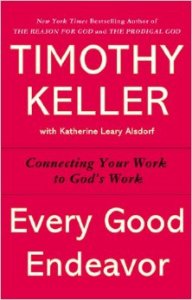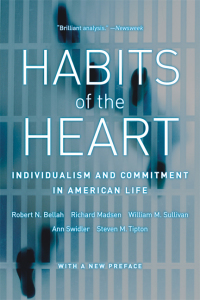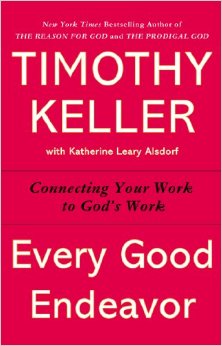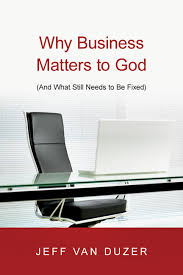I’m going to write about work today, and the meaning of work from a Christian perspective. But more importantly than a Christian perspective, I’m going to write about God’s perspective of work, and how it is radically different than our culture’s view of work.
This is by no means an exhaustive look at how God views work and what the Bible says about the topic of work. This content was originally a sermon gave at my church earlier this year and has been repurposed to be a blog post (warning: a very long one). It is the result of my own reflections and reading about work, from my 15 years of working in a small business, a missions organization, as a writer, and now as an entrepreneur (Coracle Marketing is my business). There are many others with much more experience than myself and I know that they have much wisdom to add to this conversation. My hope is that this blog post encourages you in your own exploration of what work means to you and how it is part of God’s calling for your life.
For me, over the last 15 years, I’ve had the realization that how I viewed work was very wrong and that there is a better way, a redeemed way, God’s way to understand and do work.
I’m going to write about a few things:
- The dignity of work
- Work as service
- How God uses work to form our hearts and shape us
Our Culture Views Work as Punishment
I grew up believing that work was punishment. And that’s one of the common views of work in today’s culture.
You’ve probably heard of the term TGIF or “Thank God it’s Friday”, which refers to the relief and excitement many people feel when the gruelling work week is finally done. After the weekend, you might hear people say, “it’s back to the grind” or “the weekend’s too short.”
You may have also heard of the expression Freedom 45 or 55. This reflects people’s hopes to retire at 45 or 55 years of age and be free from their job.
There is a Babylonian myth about the creation of the world – a battle breaks out among the gods. Marduck emerges as the victor and creates a world from the body of his enemy Tiamat. The other gods say, “Now that you have created the earth, you have to work to keep it up.” Marduck replies, “I will create a lowly creature called ‘man’ to take care of it.” In this account of our origins, the gods scorn work and create humans to do the manual labour that they don’t want to do.
Even the Greek philosophers Plato and Aristotle view work (especially physical work) as debase – something which degrades our minds and bodies.
Why is it that we see our work as a prison sentence, something where we “do our time” and seek an early escape. It’s a tragic conclusion for the majority of us who will spend much of our waking hours working.
The Dignity of Work
The Christian perspective is very different.
The Bible’s account of creation has God working to form the world. Work wasn’t a necessary evil, but God worked for the sheer joy of it. Then God created Adam and Eve and created them in his own image, and part of that image is the image of a worker. God put Adam and Eve in the Garden of Eden – the perfect world as it was meant to be, and then God gave them work to do. He asked them to work in and care for the Garden of Eden, and also to name and rule over the animals and birds.
Many Christians misinterpret the Creation story to see work as the result of Adam and Eve sinning, and therefore, believing that work is a necessary evil. But God gave Adam and Eve work to do in the Garden before the fall, before they sinned.
Work is not a punishment. Work has dignity. Work is something that God does. God created us to work. Work is part of what it means to be human.
Now, I want to clarify what I mean by work. Work includes what you do in your job and your career, but is also much more. When I say “work”, I mean your day’s work. It includes housework like washing dishes, cooking, driving kids to school. Volunteer work whether it be with your church, a charity, or helping your grandma run some errands.
One of my favourite organizations is JustWork, a social enterprise based in Vancouver. They do home renovations, catering, and make pottery to sell. Their main goal is to provide dignified work for people in Vancouver who have barriers to work, like those with mental illnesses, physical disabilities, those that are homeless and cannot find work.
Those people could simply live off of government cheques and use their disability as a valid reason not to have to work. But this organization believes that work is part of what it means to be human, so their goal is to provide meaningful work for people, believing that work helps to give people dignity.
 Tim Keller in his book “Every Good Endeavor” says this about work:
Tim Keller in his book “Every Good Endeavor” says this about work:
“Work is as much a basic human need as food, beauty, rest, friendship, prayer, and sexuality; it is not simply medicine but food for our soul. Without meaningful work we sense significant inner loss and emptiness. People who are cut off from work because of physical or other reasons quickly discover how much they need work to thrive emotionally, physically, and spiritually.”
People need work to live fully human lives. Work is not a punishment. Work has dignity.
Our Culture Views Work as Salvation
I attended business school at UBC. It was there that I learned the other predominant view of work in our society. Business school was full of go-getters – proud, confident, and sometimes arrogant people hoping to change the world and make a lot of money doing so. They didn’t see work as punishment, but they saw work as their salvation.
How does our culture see work as their salvation? There are two ways this happens. Many people view their work as giving them identity. The more prestigious their job, the more valuable they feel. They thrive on success, and are crushed with failures. The other way that work is a person’s salvation is that work is the means of making the money they need to buy the things that will fulfill them.
When a society sees work as their salvation, it creates a hierarchy of work. Some work is valued more than other work. The impressive work of doctors and lawyers, or the exciting work of entrepreneurs and start-ups, or the world-changing work of charities is seen as most valuable. Repetitive and manual work is seen as the least valuable. It is also easy to value work by the salary it makes – with high paying work as being the most sought after.
This is definitely how I viewed things after university. 4 years of studying with ambitious people who wanted to make lots of money rubbed off on me. It didn’t help that the business school itself posted salary expectations for its graduates from different programs. I still remember the number posted on the bulletin board by the career centre – graduates specializing in Transportation and Logistics should make an average of $38,000/year. That was in 2003.
After 3 months of job seeking and unemployment, I finally found a job. But it started at minimum wage during the probationary period. It felt like an assault on my dignity to accept something with such low-pay, and it was a tough pill to swallow for my ego. If I were not so desperate to find work, I might not have accepted the job.
An Example of Work being about Ego
 Parker Palmer tells a story in his book “Let Your Life Speak” about a time when he was deciding about a job offer to be the president of a college. He asked his close friends to help him discern. His friends met with him and asked him various questions and listened to him share. One of his friends asked, “What would you like most about being president?”
Parker Palmer tells a story in his book “Let Your Life Speak” about a time when he was deciding about a job offer to be the president of a college. He asked his close friends to help him discern. His friends met with him and asked him various questions and listened to him share. One of his friends asked, “What would you like most about being president?”
Parker Palmer replied:
– I would not like to have to give up my writing and my teaching
– I would not like the politics of the presidency, you never know who your real friends are…
– I would not like having to glad-hand people I do not respect simply because they have money…
His friend gently but firmly interrupted, “I asked what you would most like?”
“Yes, yes, I’m getting to the answer.” But he continued his list of complaints. Once again his friend asked him the original question. Feeling compelled to be honest, he replied, “I guess what I’d like most is getting my picture in the paper with the word president under it.”
After a respectful silence, his friend asked, “Parker, can you think of an easier way to get your picture in the paper?”
Parker Palmer reflects about that experience by writing, “By then it was obvious, even to me, that my desire to be president had much more to do with my ego than with the ecology of my life.”
Many people, including myself for many years, end up believing that lower-status or lower-paying work is an assault on their dignity. The result is that many people take jobs that they are not suited for at all, choosing to aim for careers that do not fit their gifts but promise higher wages and prestige.
Too many times we see work as a means to an end – money or prestige, but miss out on valuing the work itself.
Work as Service
 When talking about work in his book God in My Everything, Pastor Ken Shigematsu from Tenth Church uses the term “co-creating with God.” God’s work is done in partnership with us – that is why it is so important. God uses our work to serve and provide for the world.
When talking about work in his book God in My Everything, Pastor Ken Shigematsu from Tenth Church uses the term “co-creating with God.” God’s work is done in partnership with us – that is why it is so important. God uses our work to serve and provide for the world.
Here’s an example. When you are praying the Lord’s Prayer and saying, “Give us today our daily bread”, how does God respond?
God could respond by instantly providing the food that we need. Our prayer can kind of be like ordering at a restaurant: “Dear God, please provide us with dinner tonight. I’d like a steak, medium-rare, with a side of potatoes and vegetables. The vegetables need to be organic. And the beef has to be free-range and organic and grain-fed. Oh, and chocolate cake for dessert.” And then poof, our meal appears. Kind of like how God sent manna from the sky to feed the Israelites in the Old Testament.
But that is not the way that God chooses to provide the food that we need.
Instead, God provides through:
– Farmers, caring for the cows and growing the potatoes and vegetables
– Truckers who transport the food to the grocery stores
– The grocery store staff that put all the food on the shelves, and check out the food.
– The owner of the restaurant who hires a chef to cook the food and waiters to serve the food.
– God works through the businesses that make the plates and cutlery, from the designers to the people that work in the factories.
– God provides your meal through the work of hundreds of people in multiple cities and countries.
When you think about the home you live in, the clothes that you wear, the education that you receive, the medical care provided for you… all that is the result of people co-creating with God.
Why does work matter to God? God calls us to work with him in providing for people. As Christians we must see our work as a critical way in which God is caring for human beings and renewing his world.
Work is not our salvation by giving us our worth and identity, or giving us the money to buy the things that make us happy. Our work matters because it is done in service of others.
Work that Forms our Hearts
Now to the last point, work as a way God forms our heart.
“God uses us to get work done. God also uses work to get us done.” – Ken Shigematsu
God uses the work that we do to shape us and form our hearts. He uses the work to mature us as disciples.
 In his classic book The Divine Conspiracy, Dallas Willard writes – “to not find your job to be the primary place of discipleship is to automatically exclude a major part, if not the most, of your waking hours from life with him. The gospel turns your work into a spiritual formation training center.”
In his classic book The Divine Conspiracy, Dallas Willard writes – “to not find your job to be the primary place of discipleship is to automatically exclude a major part, if not the most, of your waking hours from life with him. The gospel turns your work into a spiritual formation training center.”
I have a daughter named is Allie (who just turned 3 a few days ago). Earlier this year she and I baked cookies together. Now baking cookies is already a lot of work, but baking cookies together with a toddler is even more work.
Why did I want Allie to help me in baking the cookies? It wasn’t that I needed the help. In fact, it would’ve been faster (and much much cleaner) if I did the work by myself.
 But I wanted Allie to bake with me because of relationship. This was time we could spend together, working on a project, and learning about each other. I wasn’t just creating useless work to keep her occupied, my hope was to involve her in the work that I was doing, that she actually is helping me and we are working together. And at the end I wanted us to share in the sense of accomplishment of a job well done.
But I wanted Allie to bake with me because of relationship. This was time we could spend together, working on a project, and learning about each other. I wasn’t just creating useless work to keep her occupied, my hope was to involve her in the work that I was doing, that she actually is helping me and we are working together. And at the end I wanted us to share in the sense of accomplishment of a job well done.
In the same way, God invites us to work and co-create with Him because of relationship – working with Him is one way we deepen our relationship and get to know the heart of God.
The other reason I wanted Allie to bake with me is because I wanted her to learn and grow. I gave her tasks that challenged her, tasks that allowed her to practice her fine motor skills, tasks that gave her opportunities to learn to follow instructions and show patience. Allie loved mixing the ingredients, pouring the flour, and making little balls out of the cookie dough. And of course she loved eating the cookies.
In the same way, God gives us work to do to form our hearts, to mature us, to help us grow to be more like Jesus.
How God Used My Work to Teach Me to Love My Enemy
As I was reflecting on this point, God opened my eyes to see how He has used work to shape me in the past.
In the Scriptures Jesus calls us to love our enemies. I feel like modern-day enemies are often found in the workplace. If you think about people that you dislike or even hate, people at work may come to mind. Maybe it’s a boss that mistreats you. A colleague that is obnoxious. A supplier that is always making mistakes and creating extra work for you.
For me, it was a customer that was both rude and demanding. In my first month of work, I made a mistake in some documentation that was given to a customer. Her name was Laura (not her real name) and she called me, lost her temper, and yelled at me for 10 minutes straight. Yelled and yelled and yelled. It was pretty traumatic for me.
And for some reason, my boss assigned this customer to me – part of my job was to provide customer service to Laura. I hated it. She was so picky and rude and had anger problems, and I was always afraid she would blow up at me. She was my enemy. How do you know that someone is your enemy? My definition is that you do not wish them well. I secretly hoped that her business would fail, so I wouldn’t have to deal with her. But, her business survived.
Every week she called, and I would have to serve her, again and again. Book this shipment. Change this order. Give her this quotation. Week after week, month after month, year after year. The interesting thing is that after 2 years, I became quite fond of her. And she became quite reliant on me. Even after I switched roles at work, and my colleague took over my role, Laura would still call me to ask for things to get done. And when she did, I genuinely wanted to help her.
If it were my choice, I would never have interacted with Laura after that first experience. Instead of loving my enemy, I would have avoided my enemy. But because of my work, I had no choice but to serve her day in and day out, even though I really disliked her at first. And slowly, through the work of service, God formed and shaped my heart to learn to love my enemy.
God uses work to form our hearts.
A Better Way to Work
To conclude I want to talk about the implications of gaining a fresh perspective about work. As Christians, God calls us to:
– View work with dignity, because God himself worked and he created us to work.
– View work as service, a way where we can co-create with God and serve others in the world
– View work as a place where discipleship happens. God uses work to form our hearts.
 As we understand God’s perspective of work, we are better able to discern the work of our own lives. Robert Bellah, in his book “Habits of the Heart” says this,
As we understand God’s perspective of work, we are better able to discern the work of our own lives. Robert Bellah, in his book “Habits of the Heart” says this,
“To make a real difference… [there would have to be] a reappropriation of the idea of vocation or calling, a return in a new way to the idea of work as a contribution to the good of all and not merely as a means to one’s own advancement.”
When I worked in the missions organization, we often asked people to consider joining us in the work of evangelism and discipleship. Before joining us, we asked them consider seriously whether they were called to this work. It is common the people going into ministry or missionary work to go through discerning process of prayer and wise counsel before starting this work.
When we see the importance and dignity of all work, we end up seeing work not merely as a job, but as part of our calling. And it becomes crucial for people deciding to be firemen, pilots, chefs, nurses, social workers – any and every Christian, to ask themselves what God has called them to do, and to do that work with all their heart.
And as people who follow Jesus, we can help each other discover and live out our callings through our work, affirm the gifts and strengths that we see in each other, and encourage and pray for each other.
Book Recommendations
Out of all the books I’ve read of this topic, these are my favourite three and the ones that I’ve found the most helpful and hopeful in shaping my theology of work.
Every Good Endeavor: Connecting Your Work to God’s Work, by Timothy Keller

Let Your Life Speak: Listening for the Voice of Vocation, by Parker Palmer
This is a book about calling and vocation, and perfect for someone thinking through what their calling is, and how to live out their calling through their work.

Why Business Matters to God: (And What Still Needs to Be Fixed), by Jeff Van Duzer
This book is specifically about the Theology of Business, and perfect for entrepreneurs or people in business.


